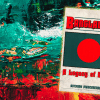Stories of the liberation war, and how we must never forget to pass it on

There is no success without sacrifice. Victory minus struggle. Fifty years have now passed since that glorious day in December 1971 when we achieved victory after a battle for nine months. The sacrifices made during those days of war will forever remain irreplaceable losses for our nation.
One can never stand on the ground without firmly holding on the roots. That is one lesson from history we have learned. And, unfortunate it may seem that despite all the exercise involving the preservation of the history of the liberation movement, we have failed to address the issue widely to the younger generation. How we may bring the topic of liberation war to those born decades later is a matter of deep concern, but it has to be done!
The Liberation War of 1971 was a people's struggle. Battles were fought at the frontiers, and war raged in the most unthinkable of places. People wholeheartedly supported the freedom movement, sans a few individuals who opposed the spirit of liberation; some abetted and engaged in war crimes.
Those who were witness to the momentous moments of this nation's history, those who took part in the war — freedom fighters — are now among the elderly. Many we have lost, yet their endeavours remain etched in time.
While historians embark in their effort to preserving the past. It can be said without an iota of doubt that one must nurture a 'historian' within every individual, especially the younger generation. And perhaps the best way of doing so is through story-telling.

Every person witness to the War has unique narratives — some of gallantry, others of sorrow, and loss. Some stories are just trivial matters of everyday lives, yet set in the context, they emerge as an important tool in understanding the past. We must preserve these stories and one of the ways of doing so is perhaps by presenting the human angle to the liberation movement.
It will take time for a generation who did not witness the War to come to terms with it as the barriers of time are separating us further still. The practice of transmitting history must remain as a continuous effort and not limited to days of special significances.
Many of us grew up listening to the stories of our grandparents, our fathers, mothers, and uncles and aunts. They were not necessarily stories of the freedom movement; perhaps the time has come to make a conscious effort to make our stories relate to the liberation struggle.
It is not an easy task, but once stories are absorbed in their spirit, those willing to embark on an academic pursuit can do so on their own. It would be wrong to expect every new individual to become an expert of the War, but it is essential that every individual becomes a treasure trove of stories to pass on to the next generation, not as a history lesson, but a part of our past.

 For all latest news, follow The Daily Star's Google News channel.
For all latest news, follow The Daily Star's Google News channel. 







Comments